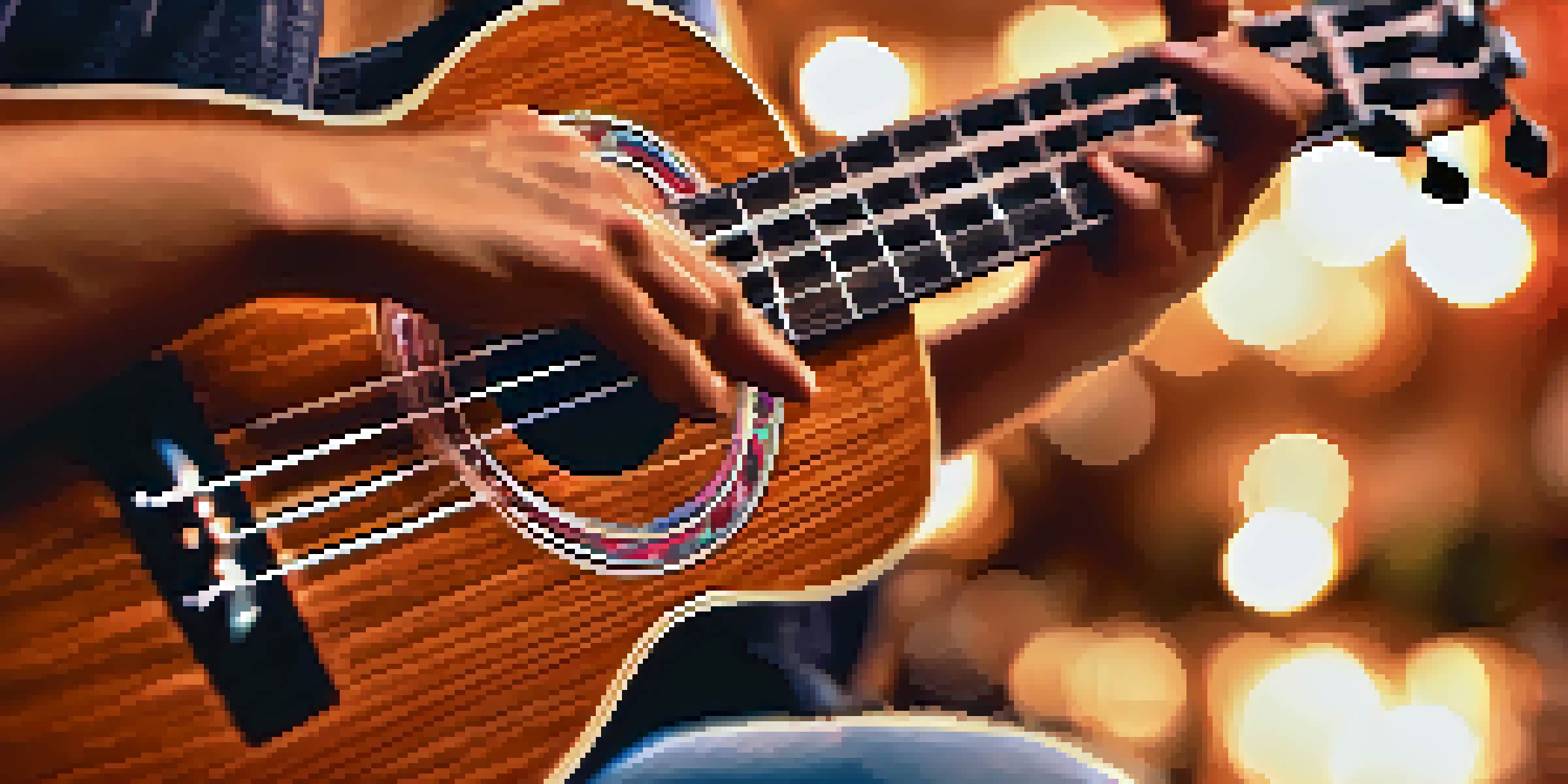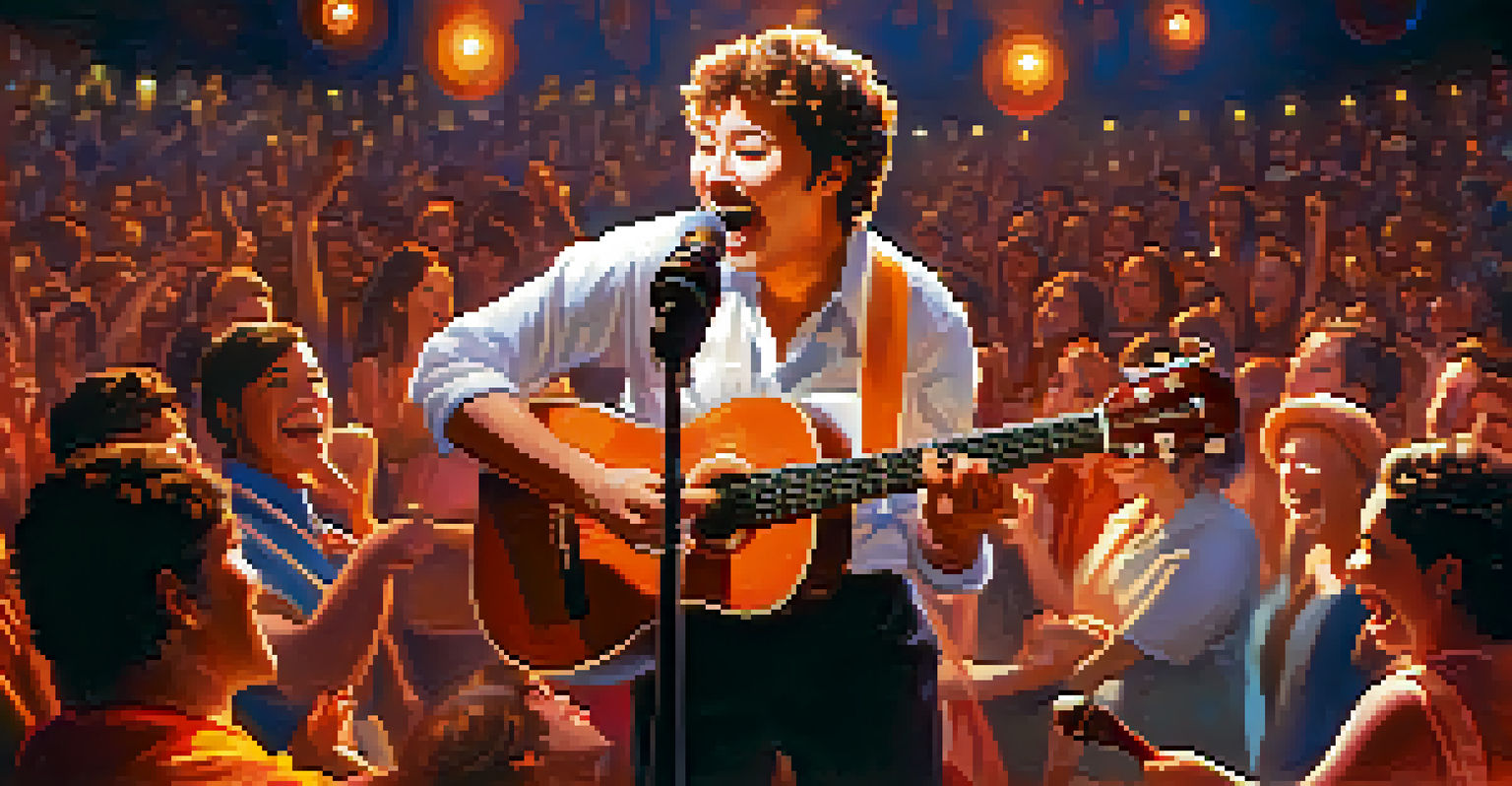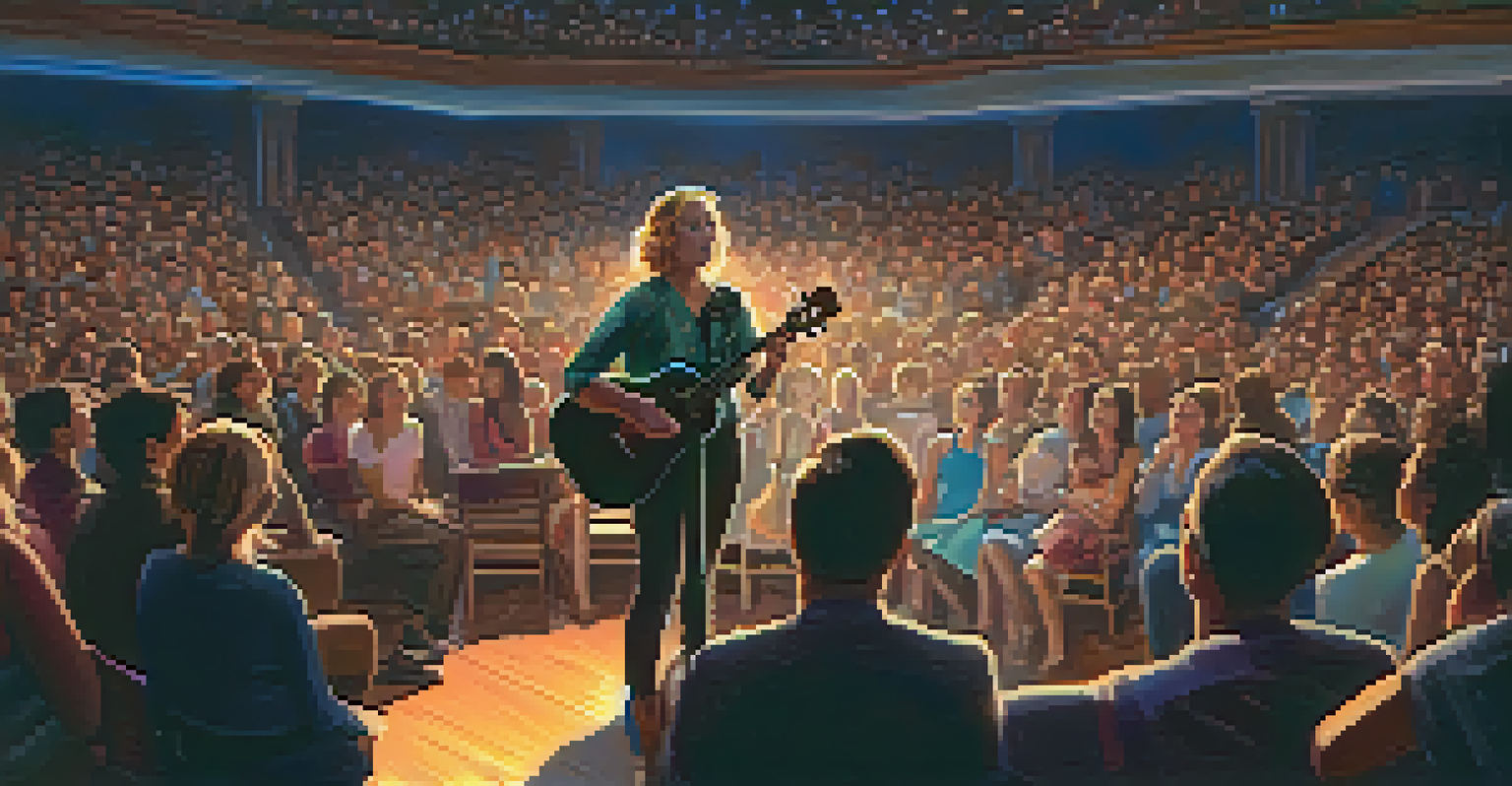Building Your Stage Presence as a Ukulele Performer

Understanding the Importance of Stage Presence
Stage presence is more than just playing your ukulele well; it’s about connecting with your audience. When you perform, your energy and charisma can turn a simple song into an unforgettable experience. Think of it as the difference between watching a movie with a captivating lead actor versus a bland one; the engagement level can skyrocket.
People will forget what you said, people will forget what you did, but people will never forget how you made them feel.
A strong stage presence draws people in and keeps them engaged, making them feel a part of your performance. Imagine you’re telling a story with your ukulele, and your audience is the eager listener, hanging onto every note. This connection can lead to a more memorable show and leave a lasting impression.
Ultimately, your stage presence can turn casual listeners into devoted fans. They’ll not only remember your music but also the joy and energy you shared with them during the performance. So, let’s dive into how you can build that captivating presence on stage!
Finding Your Unique Style as a Performer
Every performer has a unique style, and finding yours is crucial for developing your stage presence. This style can be influenced by your personality, musical genre, and even the stories you want to share. Think about your favorite artists—what do you love about their performances? Emulate those aspects while adding your personal touch.

To discover your unique style, try experimenting with different genres and performance techniques. For instance, if you enjoy upbeat, lively music, don’t be afraid to dance a little while you play. Alternatively, if you prefer a more laid-back vibe, consider storytelling between songs to create intimacy with your audience.
Connect with Your Audience
Stage presence transforms a performance into a memorable experience by fostering a genuine connection with the audience.
Remember, authenticity resonates with audiences. When you perform in a way that feels true to who you are, it shows, and people will naturally be drawn to your performance. So, take some time to reflect on your influences and what makes you unique—this will be the foundation of your stage presence.
Engaging Your Audience Through Eye Contact
Eye contact is a powerful tool when it comes to engaging your audience during a performance. It creates a sense of connection and intimacy, making each person feel as though you’re performing just for them. The next time you’re on stage, try looking into the eyes of your listeners instead of staring at your instrument or the floor.
The best way to make your audience feel something is to first make yourself feel something.
Establishing eye contact can turn a simple performance into a heartfelt interaction. For example, you might notice someone smiling or tapping their foot along with your music. Acknowledge that energy by locking eyes with them; this simple act can intensify the emotional experience for both you and the audience.
Don’t worry if it feels a bit daunting at first; like any skill, it gets easier with practice. Start by focusing on different sections of the audience and gradually build your comfort level. Over time, you’ll find that making eye contact becomes a natural part of your performance, enhancing your overall stage presence.
Using Body Language to Enhance Your Performance
Body language plays a significant role in how your performance is perceived by the audience. Gestures, posture, and movement can all convey emotions and energy that words alone might not express. For instance, open arms can signify warmth and welcome, while a confident stance can project authority and engagement.
Consider incorporating intentional movements while you play your ukulele. Whether it's swaying to the rhythm or stepping forward to connect with the audience, these actions can amplify your message. Think of your body as an extension of your music, enhancing the overall experience and making it more dynamic.
Embrace Your Unique Style
Discovering and expressing your unique performance style is essential for authenticity and resonates with listeners.
However, be mindful not to overdo it; the key is to find a balance that feels natural. Too much movement can be distracting, so aim for fluidity and authenticity. As you practice, pay attention to how your body language complements your music, creating a cohesive and engaging performance.
Incorporating Storytelling Into Your Performance
Storytelling can be a powerful way to engage your audience and create a deeper connection during your performance. Sharing the inspiration behind a song or a personal anecdote can make your music more relatable. This not only entertains your listeners but also gives them insight into who you are as an artist.
Consider weaving in short stories or anecdotes between songs. For example, if a song is about love lost, share a brief story about a moment that inspired it. This context can enhance the emotional weight of the song and draw the audience closer to your experience.
Remember, the goal is to connect on a human level. Audiences appreciate vulnerability and authenticity, so don’t shy away from sharing your journey. Your stories, paired with your ukulele, can create a memorable tapestry that resonates long after the performance is over.
Practicing Mindfulness and Staying Present
Mindfulness is essential for performers, as it helps you stay grounded and present during your performance. When you focus on the moment, you can let go of nerves and truly connect with your music and audience. Practicing mindfulness techniques, like deep breathing or visualization, can help you cultivate this presence.
Before stepping on stage, take a moment to center yourself. Close your eyes, breathe deeply, and visualize a successful performance. This practice can calm your nerves and set a positive tone for the show, allowing you to engage genuinely with your audience.
Utilize Feedback for Growth
Seeking feedback and continuously refining your performance techniques is key to enhancing your stage presence over time.
Being present also means responding to the energy of the crowd. If they’re vibing with a particular song, don’t hesitate to extend that moment. Mindfulness enables you to adapt and react, ensuring that your performance feels alive and spontaneous, which audiences love.
Getting Feedback and Continuously Improving
Lastly, seeking feedback is vital for growth as a performer. After each show, take some time to reflect on what went well and what could be improved. You might ask trusted friends or fellow musicians for their insights as well. Constructive criticism can be invaluable in honing your stage presence.
Consider recording your performances to review later. Watching yourself can provide a fresh perspective on your body language, engagement, and overall energy. Look for areas where you can enhance your connection with the audience or adjust your performance style.

Remember, building stage presence is an ongoing journey. Embrace the feedback, learn from each performance, and experiment with new techniques. With dedication and practice, you’ll see your stage presence evolve, creating an even more enjoyable experience for both you and your audience.